|
FAQs on Sponge Identification
21
Related Articles: Sponges in Marine
Aquariums
Related FAQs: Sponge ID
1, Sponge ID 2, Sponge ID 3, Sponge ID 4, Sponge
ID 5, Sponge ID 6, Sponge ID 7, Sponge ID
8, Sponge ID 9, Sponge ID 10, Sponge ID 10, Sponge ID 11, Sponge ID 12, Sponge ID 13, Sponge ID 14, Sponge ID 15, Sponge ID 16, Sponge ID 17, Sponge ID
18, Sponge ID 19,
Sponge ID 20, & Sponges 1, Sponges
2, Sponges 3, Sponge Selection, Sponge Compatibility, Sponge Systems, Sponge Feeding, Sponge Disease, Sponge Reproduction,
|
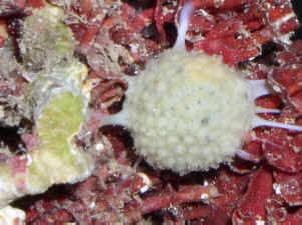
|
|
ID... Marine? Terrestrial?
8/15/18
Hello,
<Ron>
And thanks for any help you can provide.
<Let's see...>
I do some collecting for my aquarium when I snorkel in the Florida Keys. I found
this in 2' of water 100' of the edge of a small island on the Florida Bay side
of the Keys. It was in the bright sun on the surface of the seabed, not under a
rock. I thought it was a small green sponge as it was in a small group of other
sponges (purple, orange and brown). The others are obvious sponges, but this one
has no excurrent holes I can find, and even with a magnifying glass I don't see
any incurrent pores. I looked at a lot of sponges anyway and the only thing that
came close is a ball sponge. But there were no green ones. The ones with the
longest bumps or spines were way shorter than these. And they all seemed to come
from cooler or colder waters. This was found in 80+ degree water. That leads me
to assume it's an algae. But I've looked at hundreds of algae photos and found
nothing remotely similar to this. I forwarded the info to 2 marine biologists I
deal with at a local marine museum and they were stumped as well!
<I as well... >
It's slightly smaller than a golf ball. It's not hard or soft but firm, like a
very small cell sponge. But as I said, I see no excurrent or incurrent holes or
pores. The appendages or spines are stiff but not hard.
It does not move, but in just a day or two it has attached to a rock. It is
currently sitting next to, almost on, a small rock flower anemone. Neither seems
to mind being in contact with the other.
<Am thinking this is a terrestrial fruit or seed of some sort; summat like a
drowned soursop. I'd be looking along the shoreline for more>
Thanks in advance for any help you can provide. Even if it's just leads to other
places to look or other people to ask. I want to put it in my display tank, but
I'm concerned it may go 'sexual' like Caulerpa algae and nuke my tank or spread
all over the tank.
<I'd be careful... not keep this in a prized setting>
Regards,
Ron Lindensmith
<Do me/us a favor and cut one open along the median and send a pic. Bob Fenner>
|
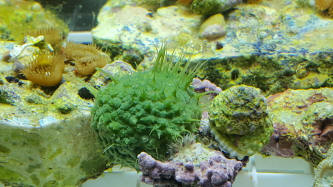
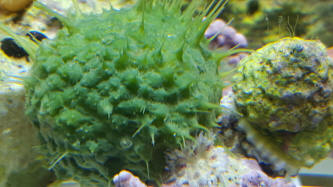 |
|
Re: ID 8/16/18
Hello Bob,
The idea that it could be terrestrial never entered my mind, or anybody else's
that has been involved in the ID process so far. So A+ for thinking outside the
box. And thanks for sharing that idea. I'll certainly pursue it more. But I
don't want to cut open the only specimen I have just yet.
<Okay; and have shared amongst friends, on Facebook!>
We were just off Little Money Key (Florida Bay side at the SW end of the Seven
Mile Bridge) which was virtually stripped clean of 95% of it vegetation 11
months earlier and still looks quite desolate except for a small amount of green
along 10% of the island on the side where we found this.
<Ahh! >
Would you assume the green is some kind of algae growing on the fruit or seed
pod?
<Nah; am more inclined to try scraping a bit off and looking under a few hundred
power 'scope>
The green is still alive as the 'spikes' or 'tendrils' are growing small spheres
at their tips and the spheres have tiny spikes sticking out of them. No many
terrestrial plants would germinate in saltwater.
<Well... there are some 53 families of embryophytes that have "gone back" to the
sea... considered "mangroves"... but again; I know naught>
Thank you for your incite and any further views would also be welcomed.
<Thank you Ron; for your continued sharing. BobF>
Regards,
Ron
Re: ID 8/16/18
Ron, howsit?
Marco Lichtenberger sent in a reply; and he (and I) think what you have is the
seed of a Platanus species of tree. Do see this genus, pix... sugar maple,
"monkey-ball" trees.
Perhaps P. hispanica or occidentalis for the location. Bob Fenner>
Re: ID 8/16/18
Bob, if I'm not mistaken, that is a very northern tree, and it's seed would end
up in the Florida Keys?
Ron
<Mmm; well, trees get moved about quite a bit. I would not be surprised to find
a Platanus member nearby the water, some place where the fruit could get into
the water and wash down to the sea. BobF>
Odd ID, green spiky ball 8/18/18
Bob I sent it to the sponge ID God at the nmnh, Dr Klaus Ruetzler for a look. I
don't know if he is still there or not but his email seems to work even though
he is Emeritus now. If not, I know Dr Allen Collins there. Allen is Curator of
jellyfish and the likes. They must still have a Sponge Curator there. He would
know.
that was really quick... Lol
"You are right, this is a sponge: Tethya actinia de Laubenfels, 1950, first
described from Bermuda. Both the orange and green varieties occur there
together. I’m not sure what causes the green color. I seem to remember to have
checked for algal/cyanobacterial symbionts but did not find any.
Klaus"
https://www.sealifebase.ca/summary/Tethya-actinia.html
<Thank you Boomer and Dr. K, BobF>
|
|
Identify? 5/21/18
Hi Bob
Can you tell me what the yellow Lacy looking area is?
<A boring sponge of some sort Tracy... drilling into the coral. BobF>
Thanks!
|
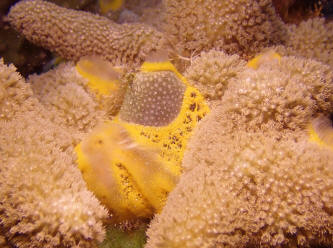 |
|
Sponge ID 5/4/18
I came across this photo on your website while looking for an ID on
organisms exactly like it in our aquarium. Could you identify the
species for me?
<Not specifically; no. A leuconoid of some sort>
Thank you!
April
<Welcome. Bob Fenner>
|
 |
|
Identification of Growth on Live Rock
8/19/17
Hello Bob-
<Hey John>
Can you please advise on what's growing on my live rock in this picture?
Is it mushroom colonization or propagation or a type of sponge growth?
<I'd put my small moolah on the latter>
I am guessing the later maybe due to extra nutrients in the water as I've had a
number of predator fish in this 265 gallon but recently thinned it out with some
transfers.
Thank you,
John
<Nice pic and beautiful growth. I'd keep it. Bob Fenner>
|
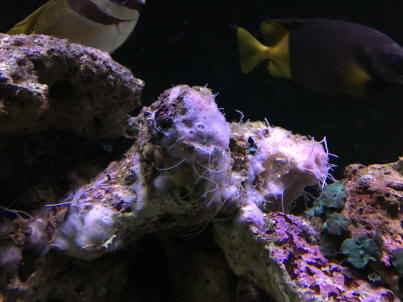
Re: re: Identification of Growth on Live Rock
8/20/17
OK. Cool. Thank you as always!
John
<Ah, welcome. BobF>
|
|
|

